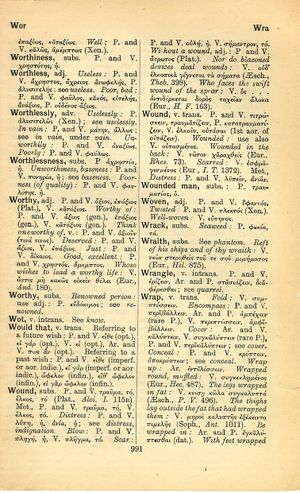wound: Difference between revisions
m (Text replacement - "<b class="b2">H. F.</b>" to "''H. F.''") |
m (Text replacement - "<b class="b2">Theb.</b>" to "''Theb.''") |
||
| Line 14: | Line 14: | ||
<b class="b2">Without a wound</b>, adj.: P. and V. [[ἄτρωτος]] (Plat.). | <b class="b2">Without a wound</b>, adj.: P. and V. [[ἄτρωτος]] (Plat.). | ||
<b class="b2">Nor do blazoned devices deal wounds</b>: V. οὐδʼ ἑλκοποιὰ γίγνεται τὰ σήματα (Aesch., | <b class="b2">Nor do blazoned devices deal wounds</b>: V. οὐδʼ ἑλκοποιὰ γίγνεται τὰ σήματα (Aesch., ''Theb.'' 398). | ||
<b class="b2">Who faces the swift wound of the spear</b>: V. ὃς... ἀντιδέρκεται δορὸς ταχεῖαν ἄλοκα (Eur., ''H. F.'' 163). | <b class="b2">Who faces the swift wound of the spear</b>: V. ὃς... ἀντιδέρκεται δορὸς ταχεῖαν ἄλοκα (Eur., ''H. F.'' 163). | ||
Revision as of 11:03, 7 August 2017
English > Greek (Woodhouse)
subs.
P. and V. τραῦμα, τό, ἕλκος, τό (Plat., Alci. I. 115B).
Met. P. and V. τραῦμα, τό, V. ἕλκος, τό.
Distress: P. and V. λύπη, ἡ, ἀνία, ἡ; see distress, indignation.
Blow: P. and V. πληγή, ἡ, V. πλῆγμα, τό.
Scar: P. and V. οὐλή, ἡ. V. σήμαντρον, τό.
Without a wound, adj.: P. and V. ἄτρωτος (Plat.).
Nor do blazoned devices deal wounds: V. οὐδʼ ἑλκοποιὰ γίγνεται τὰ σήματα (Aesch., Theb. 398).
Who faces the swift wound of the spear: V. ὃς... ἀντιδέρκεται δορὸς ταχεῖαν ἄλοκα (Eur., H. F. 163).
v. trans.
P. and V. τιτρώσκειν, τραυματίζειν, P. κατατραυματίζειν, V. ἑλκοῦν, οὐτάσαι (1st aor. of οὐτάζειν).
Wounded: use also V. οὐτασμένος.
Wounded in the back: V. νῶτον χαραχθείς (Eur. Rhes. 73).
Scarred: V. ἐσφραγισμένος (Eur., I. T. 1372).
Met. Distress: P. and V. λυπεῖν, ἀνιᾶν.

